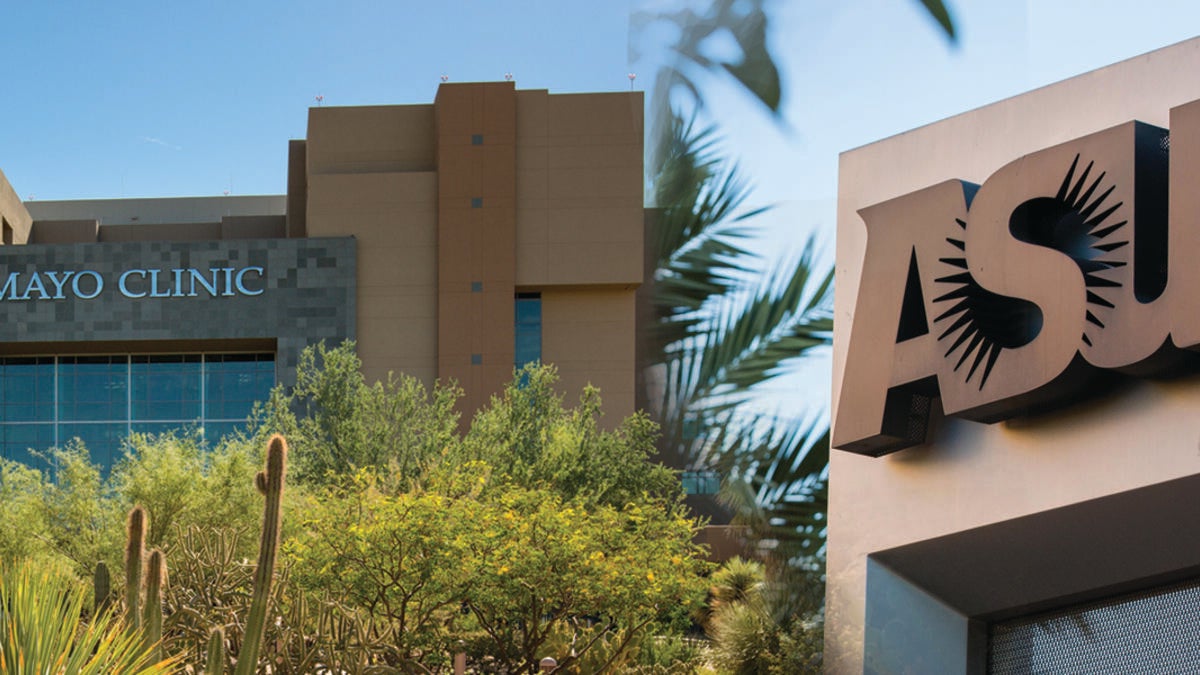For the third year, select Arizona State University faculty will spend their summer advancing research and understanding on a significant health challenge, in partnership with Mayo Clinic.
Through the Mayo Clinic and ASU Alliance for Health Care Faculty Summer Residency Program, six professors from the College of Health Solutions and Ira A. Fulton Schools of Engineering will spend six weeks working side by side with Mayo Clinic researchers at a Mayo Clinic site in either Rochester, Minnesota, or locally in Phoenix or Scottsdale.
The teams will collaborate on research that seeks to have a direct impact on patient outcomes and experiences. This year’s cohort is tackling questions relating to Alzheimer’s disease, Type 1 diabetes, liver disease and more.
“ASU is committed to advancing the health and well-being of our community, and our partnership with Mayo Clinic allows us to do just that,” said Dr. Susan Pepin, managing director of health and clinical partnerships, senior adviser to the executive vice president and clinical professor in the College of Health Solutions and Edson College of Nursing and Health Innovation at Arizona State University. “The summer residency program will support the creation of innovative new technologies, processes and systems that will improve health outcomes and help people live healthier lives.”
The participating faculty are:
Ayan Banerjee, School of Computing, Informatics, and Decision Systems Engineering, Ira A. Fulton Schools of Engineering
Project: Advance research focusing on Type 1 diabetes data from the Medtronic 670G artificial pancreas system.
Mayo Clinic Investigator: Yogish Kudva, MB.
Location: Mayo Clinic Rochester.
Murthy Devarakonda, College of Health Solutions
Project: Further develop research approaches and assess preliminary results from the methods regarding current study in artificial intelligence and natural language processing methods to treat opioid addiction.
Mayo Clinic Investigator: Teresa Rummans, MD, and Tyler Oesterle, MD.
Location: Mayo Clinic Rochester.
Erica Forzani, School for Engineering of Matter, Transport and Energy, Ira A. Fulton Schools of Engineering
Project: Improving quality of life and preventing brain damage in newborns, children and adults with urea cycle and liver disorders.
Mayo Clinic Investigator: Brendan Lanpher, MD.
Location: Mayo Clinic Rochester.
Julianne Holloway, School for Engineering of Matter, Transport and Energy, Ira A. Fulton Schools of Engineering
Project: Develop new tissue-engineered scaffolds that are capable of spatially controlling cellular behavior to regenerate the complex, heterogeneous tendon to bone interface of the rotator cuff.
Mayo Clinic Investigator: John Tokish, MD.
Location: Mayo Clinic Arizona.
Feng Ju, School of Computing, Informatics, and Decision Systems Engineering, Ira A. Fulton Schools of Engineering
Project: Creating a framework for innovating disruptive use of new MRI technology.
Mayo Clinic Investigator: James Pipe, PhD.
Location: Mayo Clinic Rochester.
Li Liu, College of Health Solutions
Project: Develop an advanced risk assessment model for Alzheimer’s that integrates new findings with traditional clinical and lifestyle-related parameters.
Mayo Clinic Investigator: Richard Caselli, MD.
Location: Mayo Clinic Arizona.
Top photo by Charlie Leight/ASU Now
More Science and technology

ASU-led space telescope is ready to fly
The Star Planet Activity Research CubeSat, or SPARCS, a small space telescope that will monitor the flares and sunspot activity of low-mass stars, has now passed its pre-shipment review by NASA.…

ASU at the heart of the state's revitalized microelectronics industry
A stronger local economy, more reliable technology, and a future where our computers and devices do the impossible: that’s the transformation ASU is driving through its microelectronics research…

Breakthrough copper alloy achieves unprecedented high-temperature performance
A team of researchers from Arizona State University, the U.S. Army Research Laboratory, Lehigh University and Louisiana State University has developed a groundbreaking high-temperature copper alloy…


